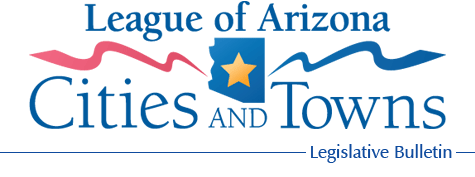
|
||
|
||
Legislative overviewToday is the 89th day of the second regular session of Arizona's Centennial Legislature. During the past week, Governor Brewer vetoed HB 2647 (county stadium districts; Rio Nuevo). Interestingly, her veto letter focused little on the substance of the legislation; rather, it explained that the she vetoed the bill because of its financial implications, stating that, "it is unwise to enact legislation that has a fiscal impact or changes tax policy until we have reached an agreement on projected revenues and appropriated expenditures as part of a state budget for Fiscal Year (FY) 2013." The Governor further wrote: "I cannot sign into law any other measure with a fiscal impact, while other critically important funding issues remain unresolved in the state budget."Read more... Consolidated electionsOn Wednesday, April 4, the Senate defeated HB 2826 (consolidated election dates; political subdivisions) by a vote of 11-17. The original bill, which previously passed the House despite the League's opposition, mandates that, with very narrow exceptions, all municipal elections must be held in the fall of even-numbered years.Read more... Council proceduresHB 2570 (political subdivisions; proceedings; governing bodies) provides that a city or town council may not take action on a proposed ordinance until it has been publicly posted in its final form for at least seven days. The bill also prescribes a process for the adoption of emergency ordinances and exempts certain other ordinances from the bill's enhanced notice requirements.Read more... FirearmsOn Tuesday, April 3, the Senate Committee of the Whole considered and passed HB 2729 (state regulation of firearms). The bill, opposed by the League, requires governmental entities to permit guns into public establishments, unless armed personnel and metal detection equipment are installed at the entrances to such establishments. The measure, sponsored by Rep. David Gowan (R-Sierra Vista), further preempts municipalities from having firearms ordinances stricter than state law. The bill now proceeds to its third reading in the Senate.Pension reformOn Monday, April 2, the Senate Rules Committee approved HB 2745 (NOW: PSPRS; employer contributions). The bill changes the Alternate Contribution Rate (ACR) requirements of the Public Safety Personnel Retirement System (PSPRS). The change would preclude an employer from paying the PSPRS ACR on a PSPRS-eligible position if the person hired to fill that position: 1) was hired before the effective date of last year's pension reform bill; 2) previously retired from PSPRS; and 3) is enrolled in another state retirement system. The League supports the bill, which will result in cost savings for some of Arizona's cities and towns. The legislation, which previously passed the House by a vote of 58-0, now proceeds to the Senate Committee of the Whole for further consideration.Animal crueltyOn Thursday, April 4, the Senate passed HB 2780 (animal cruelty; ranching dogs) by a vote of 16-13. The bill provides an exemption from animal cruelty statutes with respect to dogs involved in ranching and farming activities. An amendment previously adopted by the Committee of the Whole narrows the exemption considerably. Nevertheless, the League opposes the bill because it specifically preempts municipal ordinances involving abuse of ranching dogs. The bill returns to the House, which can concur with or reject the bill as amended by the Senate. If approved, the bill moves to the Governor for her signature or veto. If rejected, a conference committee will be appointed to reconcile differences between the House and Senate versions of the bill.Alarm installationOn Tuesday, April 3, the Senate passed HB 2748 (NOW: alarm business; alarm agent; certification) by a vote of 21-7. The measure provides for the establishment of a statewide certification requirement for alarm businesses and alarm agents, and preempts further local regulation of alarm installation. The amended measure returned to the House, where the sponsor chose to send the bill to a conference committee to make additional changes. On Thursday, April 4, the House appointed members to the conference committee; Senate appointments to the committee are pending.Public works notificationOn Tuesday, April 3, the Senate unanimously approved HB 2350 (NOW: cities; counties; regulations). The measure requires a municipality to post its capital improvement plan (CIP) on its website. Also under the legislation, a utility is entitled to receive, upon request, copies of the CIP, along with information on any new or accelerated projects. The League is neutral on the bill, which now awaits action by the Governor.Sales tax collectionOn Thursday, April 5, the Senate Committee of the Whole considered and passed HB 2466 (NOW: payment; local sales tax). The bill, which provides for the creation of an online portal for the direct remittance of taxes by taxpayers in self-collecting cities, was amended to clarify the role of the Department of Administration with respect to vendor procurement. The bill, which previously passed the House by a vote of 56-0, now proceeds to its third reading in the Senate.Spirituous liquorsOn Thursday, April 5, the Senate passed HB 2606 (NOW: liquor; omnibus) by a vote of 24-5 on reconsideration. (The measure passed the House last month by a vote of 47-9.) Among other things, the bill, sponsored by Rep. J.D. Mesnard (R-Chandler), permits the State Liquor Board to consider municipal tax delinquencies in liquor license suspension and revocation proceedings. It further permits a city or town to use the average of the last five years of the Consumer Price Index (CPI) for fee increases (as opposed to just the previous year's CPI). Because the bill was amended in the Senate, it must now return to the House for the sponsor to concur with or refuse the Senate changes.Traffic controlOn Tuesday, April 3, the Senate passed HB 2557 (NOW: intersection; definition) by a vote of 17-12. The bill redefines the definition of "intersection" in the transportation statutes to make it more difficult to cite drivers for red light violations. The bill, which arose as a strike-everything amendment in the Senate, now returns to the House for the sponsor to concur with or refuse the changes made by the striker.Political signsOn Tuesday, April 3, the House passed SB 1200 (political signs; hazardous locations) by a vote of 33-25. The bill, sponsored by Senator Sylvia Allen (R-Snowflake), stipulates that a government agency must notify the owner of a political sign in writing if a particular sign is deemed to create a hazardous condition. It further provides that, for purposes of calculating the time frame for permissible sign installation, a primary election begins on the day that early ballots are first mailed out to voters. The bill next proceeds to the Governor for her signature or veto.Emergency responseOn Tuesday, April 3, the Senate passed HB 2094 (prepaid wireless E911 excise tax) by a vote of 20-9. The bill was signed into law by Governor Brewer two days later on Thursday, April 5.The legislation, sponsored by Rep. Bob Robson (R-Chandler), levies a tax of .8 percent on the retail sale of prepaid cell phone services to assist governmental entities with maintenance, operation and capital costs associated with the 9-1-1 system. Arizona currently levies a tax on all telecommunications services for this purpose. The tax, however, is currently collected only on monthly wired and wireless services. The League supports HB 2094 as a means to effect considerable improvement of Arizona's aging 9-1-1 system. Revenue allocation districtsOn Monday, April 2, the Senate Rules Committee passed HB 2469 (revenue allocation districts). The bill was discussed by both Senate caucuses that same day. The measure, sponsored by Rep. Rick Gray (R-Sun City), authorizes municipalities to form Revenue Allocation Districts, which can pledge increases in both property tax and sales tax revenue to secure bonds issued to benefit the district. The League supports the measure, which previously passed the House by a vote of 44-13 and now heads to the Senate Committee of the Whole for further consideration.Government depositsOn Wednesday, March 21, the Governor signed into law SB 1135 (government deposits). The bill, supported by the League and sponsored by Senator John McComish (R-Phoenix), had previously passed both the House and Senate by unanimous votes.Read more... Legislator profile - Senator Robert Meza This brief description of the B-2 also applies to a secret weapon in the Democratic caucus of the Arizona Senate. Meet Robert Meza, Arizona's very own stealth legislator. Unlike many of his colleagues, Senator Meza, a third-generation Arizonan representing Glendale and Phoenix, affirmatively shuns the spotlight. He prefers to operate largely behind the scenes and underneath the radar. "The Catholic nuns of my youth advised us to do good deeds but not become braggadocios," remembers Meza. "I learned that you can be a person of great action and accomplishment without the need for accolades or the limelight." Read more... |
||
|
Legislative Bulletin is published by the League of Arizona Cities and Towns. Forward your comments or suggestions to league@azleague.org. |





